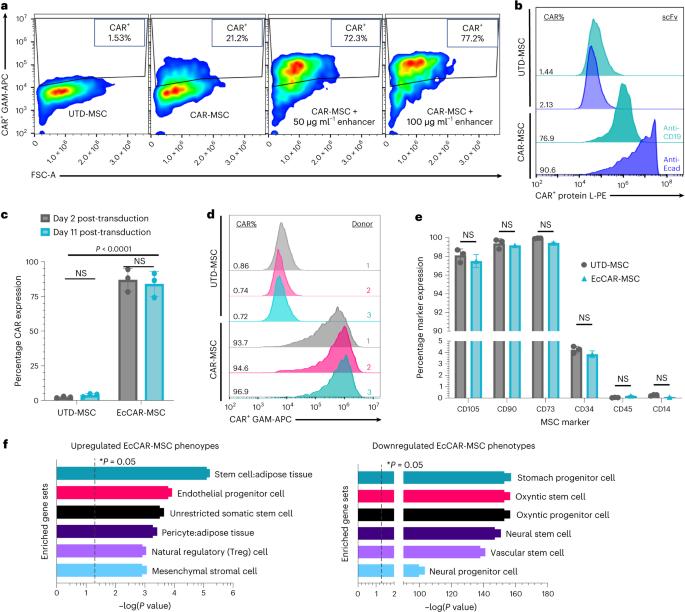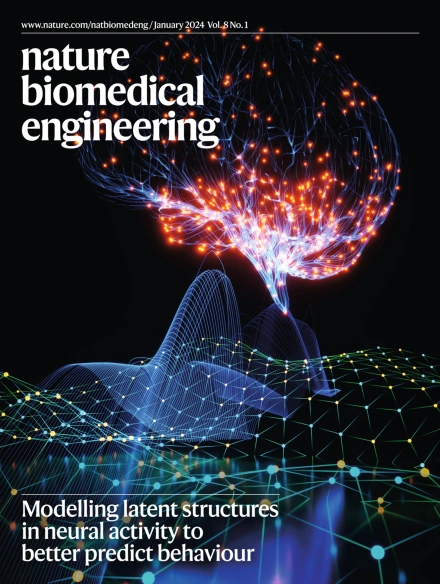Mesenchymal stromal cells with chimaeric antigen receptors for enhanced immunosuppression
IF 26.8
1区 医学
Q1 ENGINEERING, BIOMEDICAL
引用次数: 0
Abstract
Allogeneic mesenchymal stromal cells (MSCs) are a safe treatment option for many disorders of the immune system. However, clinical trials using MSCs have shown inconsistent therapeutic efficacy, mostly owing to MSCs providing insufficient immunosuppression in target tissues. Here we show that antigen-specific immunosuppression can be enhanced by genetically modifying MSCs with chimaeric antigen receptors (CARs), as we show for E-cadherin-targeted CAR-MSCs for the treatment of graft-versus-host disease in mice. CAR-MSCs led to superior T-cell suppression and localization to E-cadherin+ colonic cells, ameliorating the animals’ symptoms and survival rates. On antigen-specific stimulation, CAR-MSCs upregulated the expression of immunosuppressive genes and receptors for T-cell inhibition as well as the production of immunosuppressive cytokines while maintaining their stem cell phenotype and safety profile in the animal models. CAR-MSCs may represent a widely applicable therapeutic technology for enhancing immunosuppression. Antigen-specific immunosuppression can be enhanced by genetically modifying mesenchymal stromal cells with chimaeric antigen receptors, as shown for the treatment of graft-versus-host disease in mice.

具有奇异抗原受体的间充质基质细胞可增强免疫抑制。
异体间充质干细胞(MSCs)是治疗许多免疫系统疾病的安全疗法。然而,使用间充质干细胞进行的临床试验显示疗效并不一致,主要原因是间充质干细胞对靶组织的免疫抑制不足。在这里,我们展示了通过基因改造间充质干细胞,使其具有奇异抗原受体(CAR),可以增强抗原特异性免疫抑制。CAR-间充质干细胞能有效抑制T细胞,并定位到E-cadherin+结肠细胞,从而改善动物的症状,提高存活率。在抗原特异性刺激下,CAR-间充质干细胞上调了免疫抑制基因和T细胞抑制受体的表达,以及免疫抑制细胞因子的产生,同时在动物模型中保持了干细胞表型和安全性。CAR-间充质干细胞可能是一种广泛适用的增强免疫抑制的治疗技术。
本文章由计算机程序翻译,如有差异,请以英文原文为准。
求助全文
约1分钟内获得全文
求助全文
来源期刊

Nature Biomedical Engineering
Medicine-Medicine (miscellaneous)
CiteScore
45.30
自引率
1.10%
发文量
138
期刊介绍:
Nature Biomedical Engineering is an online-only monthly journal that was launched in January 2017. It aims to publish original research, reviews, and commentary focusing on applied biomedicine and health technology. The journal targets a diverse audience, including life scientists who are involved in developing experimental or computational systems and methods to enhance our understanding of human physiology. It also covers biomedical researchers and engineers who are engaged in designing or optimizing therapies, assays, devices, or procedures for diagnosing or treating diseases. Additionally, clinicians, who make use of research outputs to evaluate patient health or administer therapy in various clinical settings and healthcare contexts, are also part of the target audience.
 求助内容:
求助内容: 应助结果提醒方式:
应助结果提醒方式:


